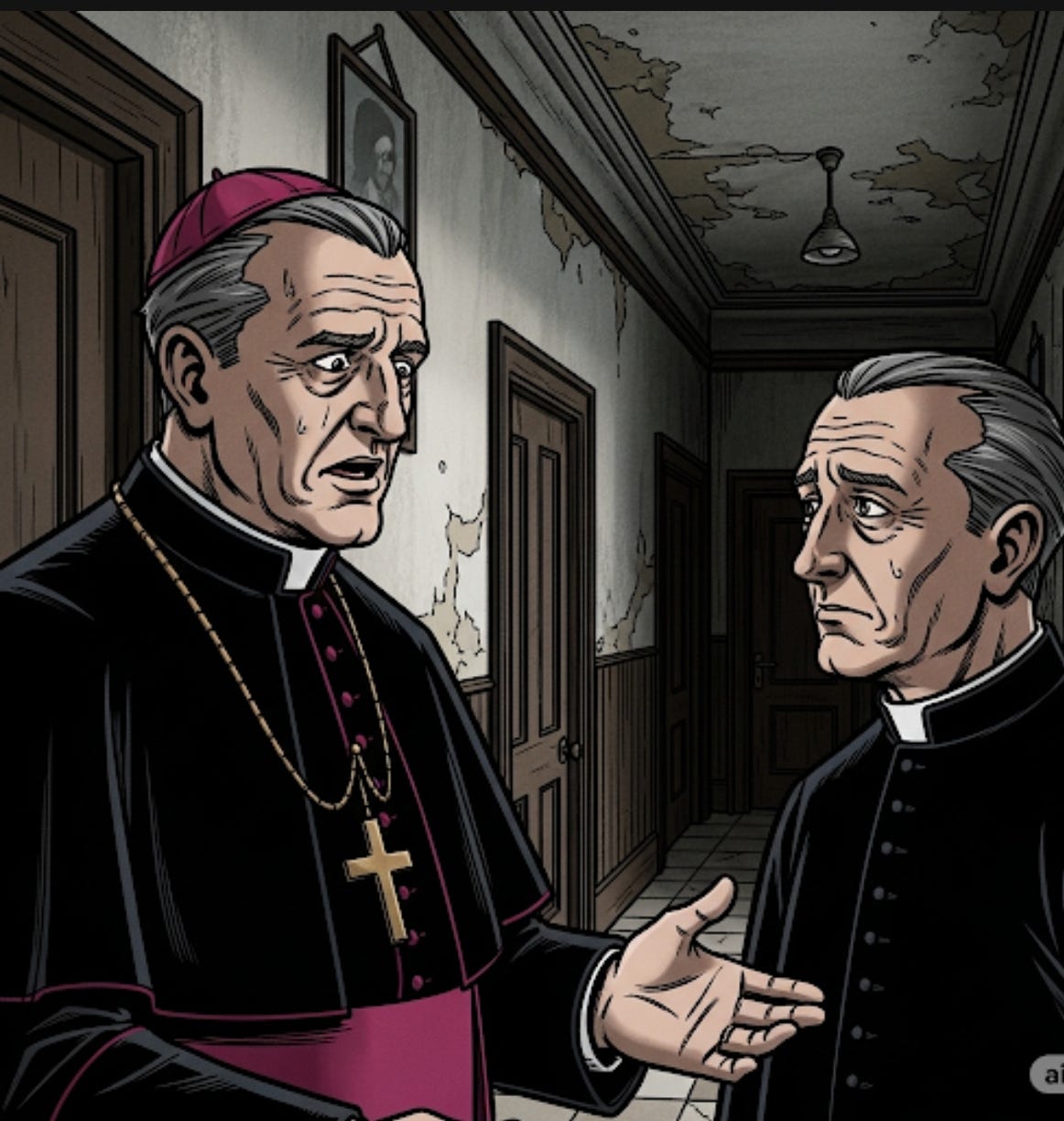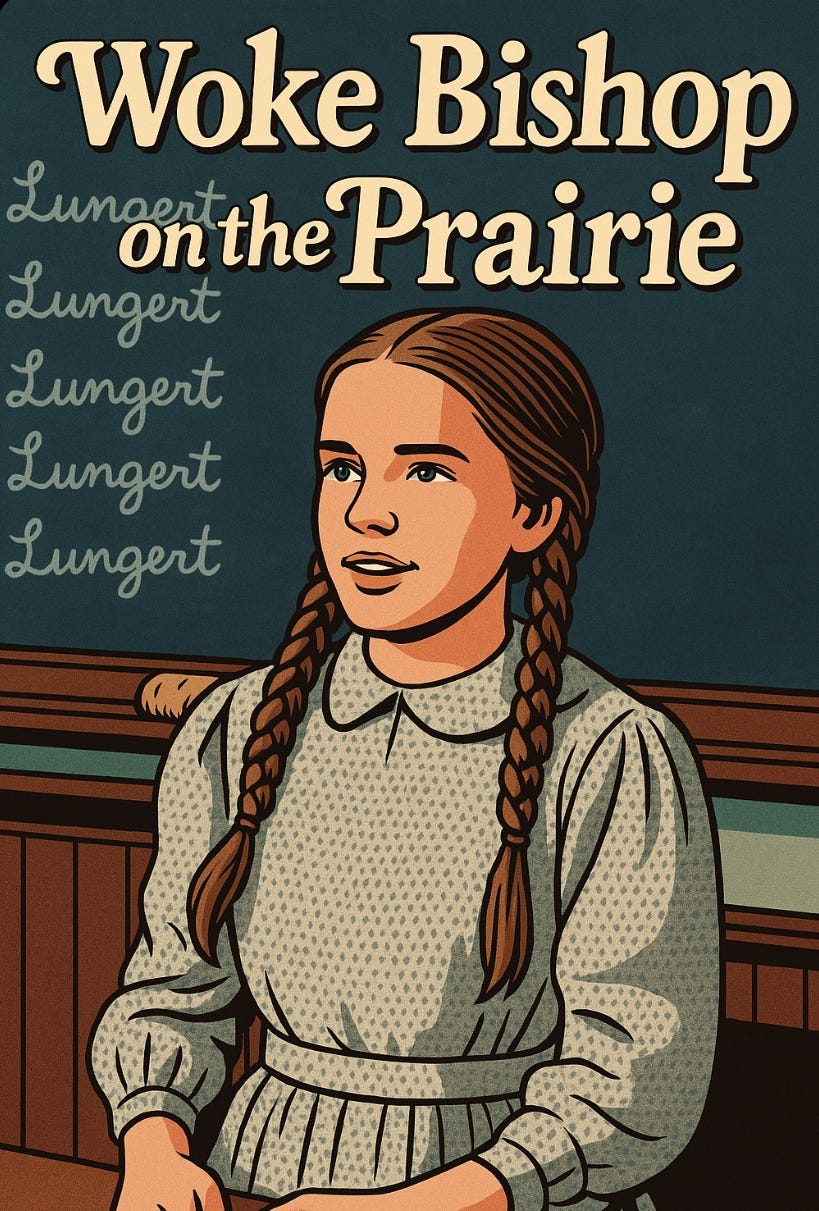A reading from the book of Laura Ingalls.
A growing trend amongst bishops, and some priests and sisters, is to engage in secularised emotionalism, transforming the faith into a maudlin, saccharin, 1970's TV programme- with dire consequences.
“The Key to the Kingdom”
The Bishop of Clonbarrick was not a wicked man, nor even a stupid one. But like many in the later years of the Church, he had grown enamoured with the fragrance of progress more than the substance of tradition. His speech was filled with the words “openness,” “dialogue,” and “solidarity”—though he often used them in curious ways, ways which puzzled even those who claimed to be fluent in post-conciliar dialects.
It was on an unseasonably warm October morning that the bishop summoned his young priest, Father Kelleher, to the drawing room of the bishop’s residence—a curious place that looked more like a modern art gallery than a man’s home. Gone were the statues of St. Michael and St. Joseph; in their place hung abstract canvases of hopeful disarray.
“My dear Father,” said the bishop with that indulgent tone reserved for bright but unthinking children, “we must, more than ever, turn the Church outward. The age of sacristy spirituality is over. The Gospel demands we be global. Political borders are accidents of geography; moral borders are relics of fear.”
Father Kelleher nodded obediently. “Yes, Your Grace.”
“The true sin of our age,” continued the bishop, sipping his chamomile tea, “is mistrust. Suspicion. Locking doors—both literal and spiritual. We must trust our fellow man. The kingdom of God is not made with bolts and keys.”
It might have ended there, a morning of episcopal musings, had not the next day broken with violence.
At precisely 6:12 a.m., a scream rang through the bishop’s residence. It was shrill and utterly un-theological. Mrs. Delaney, the bishop’s long-suffering housekeeper, stood by the side entrance in her bathrobe, pointing like a prophetess of doom.
“The silver is gone!” she cried. “And the reliquary! And—oh Lord have mercy—they’ve taken your grandfather’s breviary!”
The bishop, in slippers and without dignity, ran to the study. Indeed, it was true. The mahogany case was open. The ancient books were gone. His carved ivory crucifix—Spanish, seventeenth century—gone. Worse still, the miniature portrait of his late mother, tucked in the drawer with his ordination stole, was missing.
“But how—how did they get in?” he stammered.
It was Father Brown, standing in the hallway with his hat in hand, who answered, “With ease, Your Grace. The door was left open.”
“Open?” the bishop gasped. “Impossible!”
“I regret,” said Father Brown gently, “that it was left ajar all night. Father Kelleher was the last to come in from his evening walk. I believe he took your instructions seriously about being ‘open to the world.’”
The bishop turned a curious shade of red. He said nothing for a long time. Then slowly, like a man waking from a strange dream, he sat down.
Mrs. Delaney cleared her throat. “Shall I call the police, Your Grace?”
“No,” the bishop said hoarsely. “No. Call the locksmith.”
Later that week, Father Brown and the bishop sat on a wooden bench outside the presbytery garden. The bishop’s face was older now, more lined, as if a thin veil had been lifted from it.
“I must confess, Father,” he said quietly, “I feel like a fool. I preached about trust... and I lost everything I trusted.”
“No,” said Father Brown, shaking his head. “You trusted the idea of trust. That’s not quite the same thing. Christian trust is never naive—it’s grounded in the truth about man: that he is fallen, but redeemable.”
The bishop looked out at the hedgerows. “I suppose I confused grace with gullibility.”
Father Brown smiled sadly. “It’s a common confusion. Even the devil believes in open doors.”
They sat for a while longer, listening to the wind rustle the leaves. Then the bishop asked softly, “Do you think they’ll return the breviary?”
“No,” said Father Brown. “But perhaps this will return something else—your sense that the kingdom of heaven still requires keys.”
And for the first time in years, the bishop made the sign of the cross not out of duty, but out of a sense that he now understood it again.
In recent decades, there has emerged among many well-meaning Catholics, a growing sentiment that fidelity to the Gospel demands advocacy for open borders. Rooted in an earnest desire to honour the dignity of all people, this outlook often equates any form of immigration control with xenophobia or unchristian exclusion. However, while this impulse is noble in its intention, it rests on a sentimentalised distortion of Catholic teaching, a distortion fostered by poor catechesis, emotivism, and a flattening of the complex moral and theological landscape concerning the nature of the nation, the family, and the common good.
To correct this confusion, we must turn to the full breadth of the Church's tradition; Scripture, magisterial teaching, natural law, and sound reason, rather than to the ideologies of the age.
It is foundational to Catholic doctrine that all human beings are made in the imago Dei (Gen 1:27) and possess inalienable dignity. The Church affirms this universal brotherhood, seen most perfectly in Christ who “died for all” (2 Cor 5:15). However, this ontological equality before God does not imply that all political, cultural, or territorial distinctions are sinful or unjust.
The Second Vatican Council’s Gaudium et Spes acknowledges the value of distinct cultures (§53), while Acts 17:26 teaches that God “made from one man every nation of mankind... having determined allotted periods and the boundaries of their dwelling place.” This affirms both the unity and plurality of human societies—diversity not as division, but as providential order.
The Catholic vision is not a homogenized global mass, but a communion of peoples and cultures, each contributing to the tapestry of salvation history. The universal call to love cannot erase the particular duties one owes to family, community, and nation.
The Church upholds the legitimacy of the nation as a moral and political unit ordered to the common good. The Catechism of the Catholic Church teaches:
“The political community has a duty to honor the family, to assist it, and to ensure especially... the right to private property, to work, to housing, and to the freedom to emigrate and immigrate.” (§2211)
Yet the right to immigrate is not absolute; it must be weighed against the right, and indeed the duty, of nations to preserve social cohesion, protect their citizens, and steward resources justly. It is even more prudent when the mass immigration is deliberate.
In recent decades, a number of influential global actors have openly promoted mass immigration into Europe not merely as a response to humanitarian need, often created by the same actors, but as a deliberate strategy to reshape Western societies. Figures such as Peter Sutherland, former UN Special Representative for Migration and chairman of Goldman Sachs International, explicitly stated before the UK House of Lords in 2012 that the EU should be “doing its best to undermine the homogeneity of its member states.” This sentiment is echoed in documents such as the UN’s Global Compact for Migration, which frames migration as economically beneficial and encourages host countries to reshape public perceptions and policy accordingly. Beyond humanitarian rhetoric, such initiatives often serve economic interests—stimulating consumer demand, compensating for aging native populations, and expanding cheap labour pools. It should not be forgotten too, that the very voices claiming that the West needs replenishment through mass immigration, are themselves the cause for the shortfall in birthrates. Successive policies of abortion, the promotion of sexual promiscuity (see Adverts on Irish T.V about contraception and consent), the naturally sterile LGBT lifestyles, euthanasia, demoralisation leading to suicide, are all engineered by the same quarters who offer a solution to the problem they created. Reports from the European Commission and OECD also openly treat migrants as demographic and market “solutions.” This ideology, embraced by many in political and ecclesial spheres, advances a borderless technocratic vision that instrumentalizes migrants for globalist aims while undermining the cultural and religious cohesion of host nations. It is a synthetic universalism, cloaked in compassion but driven by utilitarian economics and ideological subversion. Many, well meaning Catholics, who are poorly informed are being manipulated.
St. Thomas Aquinas affirms the prudential balance between charity and preservation of nation in the Summa Theologiae (I–II, q. 105, a. 3), where he argues that it is just for a people to regulate the entry and integration of foreigners gradually, lest the moral and civic fabric of society be compromised. A fortiori, on account of the intentions of those with immense power who wish to destroy our nations, it is even more reason to engage with prudence, discernment and honesty.
This principle is echoed in the teaching of Pope Pius XII, who in Summi Pontificatus (1939) writes:
"The unity of the human race and the social nature of man, established by the Creator, does not conflict with the distinction of peoples and nations, which is rather required by nature itself."
Here, Catholic tradition clearly maintains that borders are not barriers to charity, but expressions of a moral order that respects both the particular good of the nation and the universal good of humanity.
Man is by nature a social and communal being. The family is the foundational society, but this expands organically into the extended kinship group, the tribe, and ultimately the nation. Attachment to one’s homeland and desire to preserve one’s culture, customs, and ancestral legacy is not a sin but an outworking of the fourth commandment, honouring one’s father and mother includes fidelity to one’s cultural inheritance.
To desire the preservation of one’s people is not racism, nor is it an affront to the Gospel. It is an act of gratitude to one’s forebears, and an act of responsibility toward future generations. To erase these distinctions under the guise of universalism is to replace Christian charity with the cultural imperialism of secular globalism.
One of the great spiritual errors of our time is the confusion of charity with sentimentality. Many Catholics today, formed more by the language of modern humanitarianism than by the Fathers and Doctors of the Church, embrace a saccharine mercy devoid of truth and prudence. But true charity, as St. Thomas notes, always includes right reason and the ordering of love: ordo amoris.
C.S. Lewis, in The Abolition of Man, warned that sentimentalism, unmoored from moral order, leads not to compassion but to chaos. Likewise, St. John Paul II, in Veritatis Splendor (§56), cautioned against a distorted compassion which undermines moral absolutes and erodes the very framework of justice.
Thus, policies founded on emotional impulses—however sincere—must be tempered by sound moral reasoning and Catholic social teaching. Sentiment is not a substitute for prudence.
To be Catholic is to love the stranger, yes, but also to love one’s own. It is not unjust to regulate immigration in accordance with the common good, nor is it sinful to wish for the preservation of one’s culture and people. It is even more important to be mindful that sentimentalisation is being weaponized to deliberately destroy nations. We know this for a fact because globalists have admitted it, plainly (see Sutherland). The commandment to "love your neighbour" (Mark 12:31) assumes you have a neighbour in the first place and that neighbourhoods, cities, and nations exist as real communities, not abstract masses.
The Church’s role is not to baptize modern political ideologies, whether globalist or nationalist, but to speak the truth in love (Eph. 4:15), upholding both the dignity of every person and the legitimate structure of moral society.
The tendency among some Catholics to equate open borders with Christian charity is a theological error rooted in sentimentality, poor catechesis, and a loss of moral clarity. Nations are not evils to be erased but moral communities to be cherished. Borders, when justly maintained, are not signs of hate but instruments of prudence. To love all mankind does not mean we must abandon our home. It means we must order our love rightly, with wisdom, courage, and fidelity to the truth of the Gospel, not the spirit of the age.
A further cause of this confusion lies with some of the modern episcopacy, particularly in the West where many bishops, either poorly formed in theology or ideologically captured by the secular globalist narrative, have begun invoking a false spirit of universalism, cloaking it in the language of Catholic teaching. This masquerade often appeals to emotion rather than to theological clarity, replacing doctrinal fidelity with sentimental manipulation.
In recent public statements, especially among the Irish hierarchy, one finds not the voice of shepherds defending Christendom, but that of secular moralists parroting slogans that align more with NGO-style globalism than with Sacred Tradition. The recent bishops conference letter was laden heavy with emotional manipulation, secular humanism dressed as theology, cherry picking, and false equivalences. The recent homily too by Bishop Nulty was an embarrassment to read. It was awful and one could be forgiven in thinking it was composed by a 14 year old, and a last minute composition on a Sunday night at that. These types of pronouncements are marked not by reference to Scripture or Magisterial authority, but by appeals to feelings of inclusion, diversity, and equality untethered from right order or prudential judgment.
The effect is disastrous. It suggests, whether implicitly or explicitly, that the Catholic Faith itself must be “updated” to align with the spirit of the age, as though fidelity to the Gospel is incompatible with loyalty to one’s nation, culture, or people. Such bishops would likely consider previous Popes—from Leo XIII to Pius XII, “racist” or “intolerant”, merely for defending Christendom and the right of nations to preserve their Catholic character. Bishop Nulty, for example, referred to “the far right”, without ever defining what it means. It was intellectually lazy, but also immoral, because as a shepherd he must ensure his clams, given his reach and authority, are rigorously sound. To generalise that people who are worried about an engineered coup, of sorts, that will permanently destroy a nation and endure a lack of social cohesion is, arguably, a dereliction of his episcopate duty.
Yes, in Christ "there is neither Jew nor Greek" (Galatians 3:28), but this mystical unity in Christ does not demand the erasure of Jewishness or Greekness, of identity, culture, or nationhood. Rather, grace elevates nature; it does not annihilate it.
Enabled by ideologically captured clergy, many well-meaning but ignorant Catholics have become victims of a growing sentiment that fidelity to the Gospel demands advocacy for open borders. To be charitable and so, rooted in an earnest desire to honour the dignity of all people (I doubt this motive for all) this outlook often equates any form of immigration control with xenophobia or unchristian exclusion. However, while this impulse is noble in its intention, it rests on a sentimentalised distortion of Catholic teaching, a distortion fostered, as I’ve indicated by, poor catechesis, emotivism, and a flattening of the complex moral and theological landscape concerning the nature of the nation, the family, and the common good. From this over sentimentalisation other errors have emerged like the circular reasoning of the absurd slogan “Love is Love”. Sentimentalisation is highly dangerous because it cuts throw reason like a hot knife through butter. Who, after all, can reject love? Well, until you put the butter back in the fridge and recognise that there are word games going on here and implied ideological assumptions about maturity, the difference between types of love, as well as other issues like maturity, the common good etc.
The hierarchy have made several egregious blunders over the last few decades. From covering up scandals, to shutting down Churches during the Covid debacle, their weak responses to the culture wars, and now, their betrayal of the nation, it seems they are at least consistent in poor judgment, or dare I say, fecklessness.
This is crucial. Whilst the young crave meaning, those in power are diluting it, including many in the hierarchy. The hierarchy have, almost all, bar very few, not only renounced tradition but also reason- they have become advertisers on pulpits, repeating the same bromides, calumnies and emotional rhetoric found in anti-Catholic newspapers and TV shows. Their submission to the zeitgeist is like a priest of old converting to pagan tree worship. The lack of leadership and cowardice in episcopal palaces cannot be compared to the bravery exhibited in previous generations, those martyrs who preferred death than betrayal. To me, at least, it seems that to be appointed bishop or any promotion these days, requires demonstrated simple-mindedness, a tolerance for everything, a more than penchant for gullibility and to top it all, sheer arrogance to boot. The youth, demoralised and seeking, will reject this cardboard theology, and then turn elsewhere for guidance- and into hands far less civil than the likes of me.










Strange how I was hoping for a conversation with a Fr. Kelleher here in Texas. And our Cathedral is closed for a major renovation.
It's all congealing like the blood of a dying person... 🤔
Since you explored misguided compassion and utilitarianism
#4 and #5, maybe in a future work you can hit all five of the attack points of evil's destructive modus operandi.
#1 Autonomy
#2 Dualism
#3 Hedonism
#4 Misguided Compassion
#5 Utilitarianism
I've tried and continue to fail to get anyone interested in what I termed THE CITADEL.
Have at it. I'll be praying.
I'm amazed at how you come up with these stories to drive home a point. Very well done.